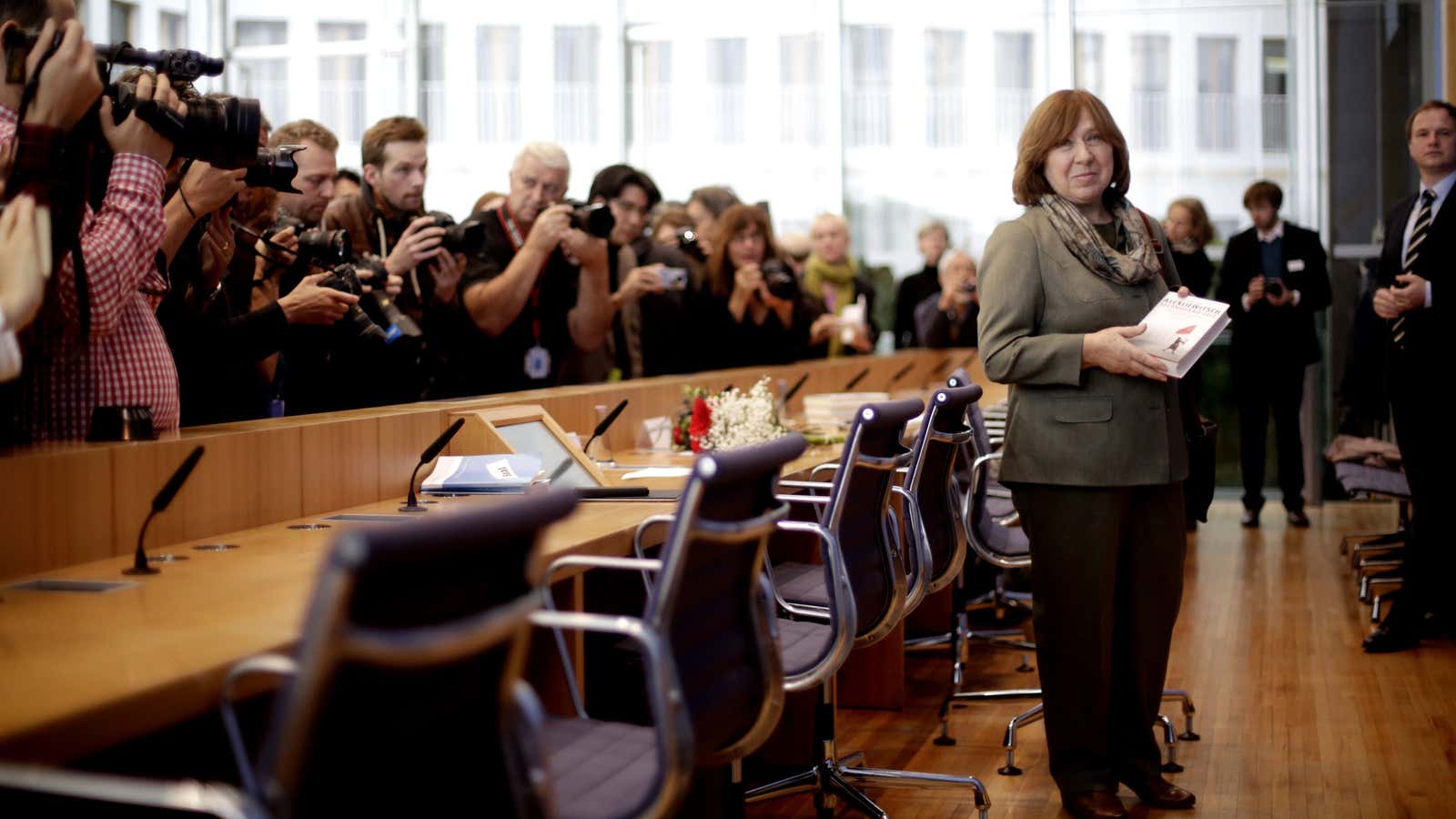The list of Nobel literature laureates who have won the prize for non-fiction writing is short.
1950: Bertrand Russell, for philosophy
1953: Winston Churchill, for history
1964: Jean-Paul Sartre (declined), for philosophy
2015: Svetlana Alexievich, for journalism/oral history
Some would leave out Sartre, since he also expressed his philosophy in plays and novels; some might add Alexander Solzhenitsyn, who has written history and political commentary, but at the time of his award (1970) he was known mainly for his fiction.
What makes Alexievich, this year’s prize-winner, unique in this already rarefied company is her method of writing. It involves compiling transcripts of interviews with hundreds of survivors of events such as the Chernobyl nuclear disaster (Voices from Chernobyl), the Soviet war in Afghanistan (Zinky Boys), or the collapse of the Soviet Union (Second-Hand Time). This “polyphonic” style is “a new kind of literary genre,” the Swedish Academy’s permanent secretary said (video, 2:28).
Alexievich was born in Soviet Belarus. As a journalist, she interviewed women who fought in World War Two (for her book War’s Unwomanly Face, published in 1985) and studied the dark side of human nature. Starting in the early 2000s, she spent a dozen years in Europe, testing Solzhenitsyn’s principle, “live not by lies,” against European values, such as humanism and tolerance.
The fusion of these values with her own empathy and listening skills made her original method more artistic. She moved from oral history in the direction of ancient Greek drama. Her writings are a conversation with other students of the human capacity for evil, such as the psychiatrist and Holocaust survivor Viktor Frankl; Hannah Arendt, the great political theorist of totalitarianism; Philip Zimbardo, author of the infamous Stanford prison experiment; and Varlam Shalamov, who, like Solzhenitsyn, chronicled life in the Soviet Gulag.
Alexievich was not the first to fuse others’ voices with her own plot and dramatic composition, but the scale of her method’s application, and her literary integrity, command respect. Her chorus of “little people,” the voices of the humiliated and insulted ones who survived the greatest disasters of the twentieth century, makes her the only living heir to the great Russian literature of Dostoyevsky and Chekhov.
The pathos of Alexievich’s situation is that, while some of her books have been successful—War’s Unwomanly Face reportedly sold two million copies—today, the humanist writer is nearly unknown in her dehumanizing homeland, and is of little interest to its people. Her print runs are modest. There are virtually no comments or votes on her books on Ozon.ru (link in Russian), Russia’s answer to Amazon.com, and most of the books are not even in stock. By contrast, the previous five Russian-language winners of the literature Nobel—Ivan Bunin, Boris Pasternak, Solzhenitsyn, Mikhail Sholokhov, and Joseph Brodsky—are all still household names.
But by awarding the Nobel to a documentarist, the Swedish academy has put a piece on the literary chessboard. As well as inventors and visionaries, it is saying, there must be a place for authors who understand human limits, yet who like to scrutinize the world, cutting off its clothes as if it were an accident victim, to examine its inner workings. For today’s Russia and its environs, a land of sad but fascinating social and moral experiments, Alexievich’s method—and her choice as a Nobel laureate—are particularly apt.
